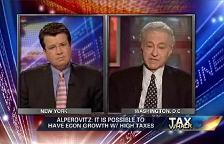- How much of wealth is the result of being born into a society with a rich heritage that is shared by all and how much is due to individual effort?
- Why should only a tiny fraction of our citizens keep most of the money made off this heritage if, in fact, it is this common background that gave them their success?
- Does this argument make income inequality morally and economically unjustified?
As our financial system lurches into an unknown future, traditional views of wealth and personal rewards are being questioned. Consequently, there is no better time for a conversation about the creation of wealth today -- who is entitled to it and who will control it. As our national financial crisis puts into stark relief, aren?t we are all in the economy together, whether rich or not?
With a bold salvo challenging the status quo, authors Professor Gar Alperovitz and Demos fellow Lew Daly tip the scales with the answers to these questions in what will be one of the most talked about books of the season: UNJUST DESERTS: How the Rich Are Taking Our Common Inheritance and Why We Should Take It Back (The New Press, publication date: November 18, 2008; $24.95 hardcover, 220 pages).
Alperovitz and Daly are in good company when they write that culture has more to do with individual success than we generally acknowledge. One of the wealthiest men on the planet, Warren Buffett, with a current net worth of $60 billion, acknowledges that "society is responsible for a very significant percentage of what I?ve earned." Bill Gates, Sr. agrees when he writes, "Success is a product of having been born in this country, a place where education and research are subsidized, where there is an orderly market, where the private sector reaps enormous benefits from public investment. For someone to assert that he or she has grown wealthy in America without the benefit of substantial public investment is pure hubris."
Drawing on cutting-edge research as well as their knowledge of philosophy and economics, Alperovitz and Daly prove that up to 90 per cent ?or even more ? of private earnings are the result not of individual ingenuity, effort or investment, but of what they describe as the "unjust" appropriation of our collective inheritance. In other words, the cumulative or aggregate knowledge that we all inherit is key to individual achievement.
The authors demonstrate that if the market rewarded people according to their contributions it would make up only 10-20% of their income. The rich don?t work harder and are not morally justified in deservingness, or ?deserts? as philosophers describe it than the rest of us. We get the commonly held viewpoint that we are entitled to own whatever wealth we create from philosopher John Locke. In his agrarian society and that of our Founding Fathers, wealth was mostly based on physical labor. In our knowledge-based society, Locke?s argument doesn?t work, since all knowledge that we receive from previous generations is a social contribution.
The individual?s role in advancing art, science and technology again is mostly based on our common heritage, too. The authors make an historically-based case for the wave of cultural and scientific knowledge that pushes a few people to the next level, the "geniuses" who create what happens next. Some enlightening examples of this argument include:
- Alexander Graham Bell and Elisha Gray, who both filed for a telephone patent on the same day, though they were working independently
- Gary Kindall who created the same computer operating system that Bill Gates then "perfected"
- Charles Darwin racing to complete The Origin of the Species because Alfred Russel Wallace was developing the same scientific argument.
Alperovitz and Daly rightly conclude that the individual isn?t really important in the case of each breakthrough. Instead, the development of knowledge is society?s forward-moving catalyst.
The second half of the book bolsters their thinking further by detailing how knowledge is shared. They note and quote widely from philosophers and economists starting with 18th century Thomas Paine and Benjamin Franklin though 20th century Nobel Laureate Herman Simon and Cass Sunstein, to name a few. The reader understands that there has always been this debate about what society owns and what is rightly owned by the individual.
What reforms do the authors suggest could begin the process of income redistribution along the lines of social justice? They say that income taxation for the top 1-2% should be increased, raising the current cap on Social Security taxes, increasing corporate taxes ? especially on windfall gains in connection with oil industry profits, and increasing inheritance taxes on large estates would be a beginning. Proceeds from the new taxes could be used for the common good, such as instituting universal health care or propping up decaying infrastructures like bridges and tunnels. In addition, education and research could receive additional funds. There is a promising plan put forth by Yale law professors Bruce Ackerman and Anne Abbott that suggests and ?capital stake? or allocation of $80,000 to every citizen upon reaching adulthood ? to be used most likely for a college education. The capital stake would be recouped at death through an inheritance tax.
Bound to be a flashpoint of discussion and contention, this bold new book will be the talk of the political circles this fall and to come.
The authors will be touring in New York, Washington, D.C., San Francisco and Seattle.
ABOUT THE AUTHORS
Gar Alperovitz is the Lionel R. Bauman Professor of Political Economy at the University of Maryland and a Founding Principal of the Democracy Collaborative. His previous Books include The Decision to Use the Atomic Bomb and America Beyond Capitalism. He lives in Washington, D.C.
Lew Daly is senior fellow at Demos, the New York City progressive think tank, and the author of God and the Welfare State. He lives in New York City.
UNJUST DESERTS
How the Rich Are Taking Our Common Inheritance and Why We Should Take It Back
By Gar Alperovitz and Lew Daly
Publication Date: November 17. 2008
ISBN: 978-1-59558-402-1
230 pages
Price: $24.95 hardcover
?A fresh and original analysis of how a modern economy progresses through the cumulative results of invention, discovery, communication and learning... A genuine work of scholarship.?
— Thomas Schelling, Nobel Laureate
?This is one of the most original and most intelligent works on economic justice I have read in many years. In clear and compelling prose, the authors update a truth that progressives should take for granted and all Americans should embrace: we are interdependent beings whose well-being depends on pursuing the common good.?
— Michael Kazin, Georgetown U.
?Alperovitz and Daly make a very strong argument, in very succinct and readable terms, about the moral limits of inequality in an age when we owe far more to society than we ourselves create individually. While those toward the bottom (Jesus called them ?the least of these my brethren?) are not getting what they humanly deserve, far too many are getting more than they deserve.?
— Harvey Cox, Harvard Divinity School
?Unjust Deserts trenchantly challenges not only the current distribution of wealth and income, but also the moral theory of individual, contribution-based desert so often used to justify it. Agree or disagree, you will see the world differently after you have read this book.?
— William A. Galston, Brookings
?Apologists for inequality assert that the rich are entitled to their property or deserve extravagant rewards because of their contributions to the general welfare. Egalitarians have challenged such claims, but with Unjust Deserts they finally have the ammunition to prove just how specious these assumptions really are... the extreme inequality we find in the United States and in the world today lacks any moral justification.?
— Judith Lichtenberg, Georgetown U.
?A fascinating and erudite treatment of a central question of our time: if much of our economy?s wealth is the result of ever-increasing accumulated knowledge, why is the distribution of income becoming more unequal and by what right are our billionaires ?entitled? to their fabulous wealth? A liberal manifesto for the 21st century, written with verve and compassion.?
— Joel Mokyr, Northwestern University
?Gar Alperovitz and Lew Daly are opening important new ground in the struggle to re-imagine America and redeem our deepest values. The inherited wealth created by our forebears in their efforts to develop our country is the "great gift" and it ultimately belongs to all of us and to the future. By reviving this insight, Alperovitz and Daly give modern Americans a key to understanding how we can create the society of justice and equality that earlier generations sought.?
— William Greider, The Nation
?Gar Alperovitz joins his considerable knowledge of economics and his admirable moral sensibility to ask a troubling but profound question: do the super-rich and the rest of us ?deserve? our wildly different economic situations because of our different contributions to the wealth of society? His research points to the falsity of this assumption. He finds instead that the wealth of society is created not by individual entrepreneurs but by the historical accumulation of knowledge. The moral conclusion is provocative but unmistakable: society itself is the source of wealth, and all of us deserve an equal share.?
— Howard Zinn
?The authors' many interesting and important insights and observations make this a work that deserves to be widely read.?
— Robert A. Dahl, Yale University
|
 Accidental Billionaire Accidental Billionaire
Boston Review (May/June 2009)
Claude S. Fischer reviews Unjust Deserts and Gladwell's Outliers
The authors have a strong wind at their backs: the current recession is displacing so many workers and depleting so many investors? fortunes through no obvious faults of their own that it becomes harder and harder to believe that everyone is getting their just deserts... Unjust Deserts has a clear political commitment, but it is well-reasoned, well-documented, well-argued.
|
 Spreading the Wealth: Spreading the Wealth:
Knowledge as Social Inheritance
Review in The Nation (12/15/08)
By Mark Engler
Warren Buffett, ranked by Forbes in 2008 as the world's wealthiest man... has said... "I really wouldn't have made a difference if I were born in Bangladesh. Or if I was born here in 1700.... I just got lucky as hell.... Stick me [someplace else] and I could say I know how to allocate capital and value business. But they'd say, so what?"
|
Why Have-It-Alls Don't Know It All
Review in Too Much (11/24/08)
By Sam Pizzigati (PDF) We actually owe our wealth, Gar Alperovitz and Lew Daly explain in this deliciously subversive new book, to what we know... And we owe what we know, the two quickly add, ?not to our own efforts or genius, but to the efforts and knowledge accumulation of those who came before us.?... In today?s deeply unequal United States, this simple observation may well rate as our society?s most ?inconvenient truth.?
|
Buzz in the Blogosphere:
Review by Polly Cleveland
Dollars & Sense (5/11/09) Georgists will find this book a treasure trove of arguments and quotations from scholars, obscure and famous, expressing views similar to those of [Henry] George.
Review by Hazel Henderson
Ethical Markets
This meticulously researched, fascinating book revisits an eternal question for all human societies, the relative roles and rights of individuals vis-à-vis society.
As a former advisor to the US Office of Technology Assessment, the National Science Foundation and the National Academy of Engineering, I can only say ?Amen,? and add my own proposal over many years: correct the classification of education from an ?expenditure? to the ?investment? column in GDP national accounts since investing in education is always our most important asset: the next generation.
Review by Paul Rosenberg
Open Left (12/07/08) This seemed particularly timely, given the vast, arbitrary shifts in wealth we've been seeing the last few months.
Review by Ryan McGreal
Raise The Hammer (01/08/09) Consider, as a single example, the curious conceit of a small handful of people (myself included) who nominally believe that we created Raise the Hammer, the website you are now reading... I call it a conceit because the site's creation (let alone its continued existence) would not have been possible without the efforts of untold and probably uncountable numbers of contributors; and curious because once made explicit, this fact is as obvious as it is unremarked.
Review by Joel S. Hirschhorn
BC: Blog Critics Magazine (11/21/08)
Feral Cat's Book of the Month
TPM Cafe (02/04/09)
Review by James H. Robbins
Philanthropy News Digest (01/30/09) We can probably all agree, especially in these economic times when even our new president criticizes Wall Street banks for giving their employees fat bonuses, that the rich do not deserve all they have.
Michael Cummins - Conservative Reaction
Campaign for Liberty (01/21/09)I am not a political alarmist. But there is a new book out by Gar Alperovitz and Lew Daly... that is garnering a disturbing amount of attention and intellectual respect, enough that we conservatives might need to take special notice... I fear that, left unchallenged, it could provide the intellectual underpinnings for a stepped-up campaign of aggressive governmental expropriation.
Will Wilkenson (CATO)
Commentary and Vlog exchange with Lew Daly (02/02/09)
Deserts and Distribution
By Matt Zeitlin (02/02/09)
"Rational Control" by Patrick Deneen
What I Saw in America (01/27/09)
Review by Homeland Colors
Great Movies, Great Books (12/18/08) Gar brilliantly explains the concept of shared knowledge and ?rent seeking?... It is a must own book that contains a great deal of information. It is an essential part of your library.
|
© 2004-2008
by Gar Alperovitz
design adapted from
original by
sOuNDz IMPOSSIBLE
|
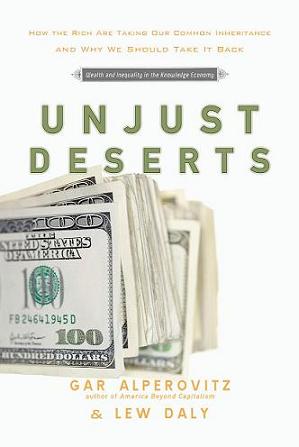
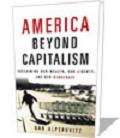






 "Justice and Injustice: Ancient Wisdom and the Modern Knowledge Economy"
"Justice and Injustice: Ancient Wisdom and the Modern Knowledge Economy"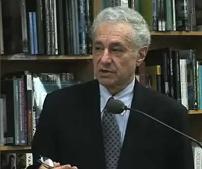
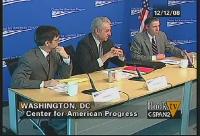
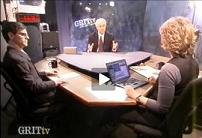
 Alperovitz talks with food co-op members in Santa Fe about issues of wealth and inequality in our economy
Alperovitz talks with food co-op members in Santa Fe about issues of wealth and inequality in our economy
